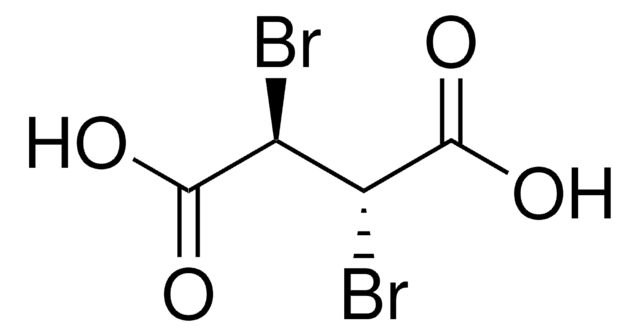All Photos(1)
About This Item
Linear Formula:
H2NCOCH=CHCO2H
CAS Number:
Molecular Weight:
115.09
EC Number:
MDL number:
UNSPSC Code:
12352100
PubChem Substance ID:
NACRES:
NA.22
Recommended Products
form
solid
Quality Level
mp
158-161 °C (lit.)
functional group
amide
carboxylic acid
SMILES string
[H]\C(=C(/[H])C(O)=O)C(N)=O
InChI
1S/C4H5NO3/c5-3(6)1-2-4(7)8/h1-2H,(H2,5,6)(H,7,8)/b2-1-
InChI key
FSQQTNAZHBEJLS-UPHRSURJSA-N
Related Categories
Signal Word
Warning
Hazard Statements
Precautionary Statements
Hazard Classifications
Eye Irrit. 2 - Skin Irrit. 2 - STOT SE 3
Target Organs
Respiratory system
Storage Class Code
11 - Combustible Solids
WGK
WGK 3
Flash Point(F)
Not applicable
Flash Point(C)
Not applicable
Personal Protective Equipment
dust mask type N95 (US), Eyeshields, Gloves
Choose from one of the most recent versions:
Already Own This Product?
Find documentation for the products that you have recently purchased in the Document Library.
The bacterial oxidation of nicotinic acid.
E J BEHRMAN et al.
The Journal of biological chemistry, 228(2), 923-945 (1957-10-01)
Hongzhi Tang et al.
Scientific reports, 2, 377-377 (2012-04-25)
Nicotine is an important chemical compound in nature that has been regarded as an environmental toxicant causing various preventable diseases. Several bacterial species are adapted to decompose this heterocyclic compound, including Pseudomonas and Arthrobacter. Pseudomonas putida S16 is a bacterium
Rafik Karaman et al.
Journal of molecular modeling, 18(4), 1523-1540 (2011-07-26)
Based on stability studies on the drugs atenolol and propranolol and some of their derivatives it is believed that increasing the lipophilicity of the drug will lead to an increase in the stability of its aqueous solutions and will provide
Yuxiang Yao et al.
Scientific reports, 3, 3235-3235 (2013-11-19)
5-Hydroxy-2-pyridone (2,5-DHP) is a central metabolic intermediate in catabolism of many pyridine derivatives, and has been suggested as a potential carcinogen. 2,5-DHP is frequently transformed to N-formylmaleamic acid (NFM) by a 2,5-DHP dioxygenase. Three hypotheses were formerly discussed for conversion
Laura Harburguer et al.
Parasitology research, 117(2), 611-615 (2018-01-01)
Severe human arboviral diseases can be transmitted by the mosquito Aedes aegypti (L.), including dengue, chikungunya, zika, and yellow fever. The use of larvicides in containers that can result as potential breeding places and cannot be eliminated is the main
Our team of scientists has experience in all areas of research including Life Science, Material Science, Chemical Synthesis, Chromatography, Analytical and many others.
Contact Technical Service









